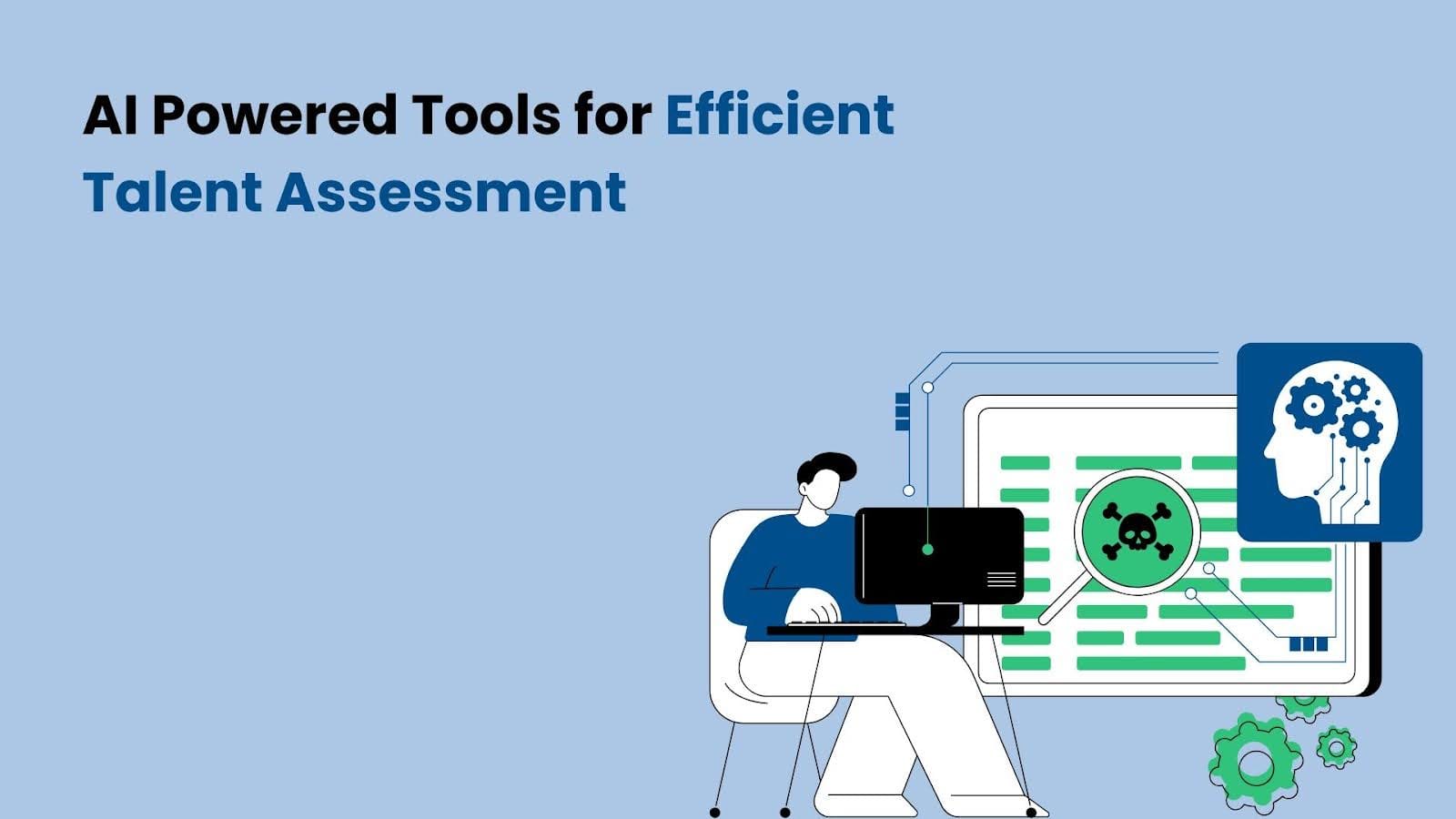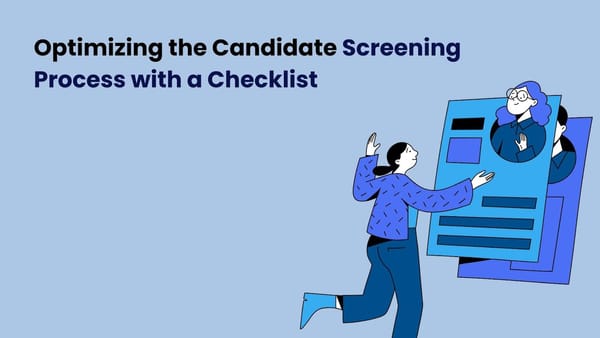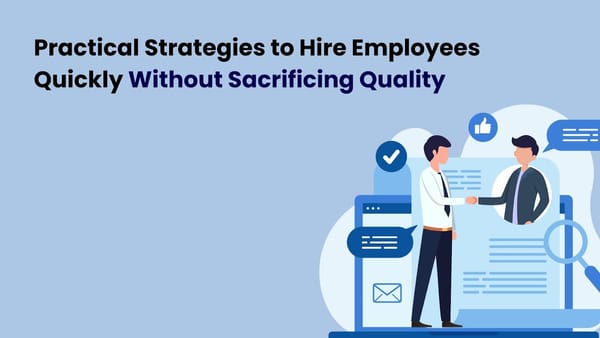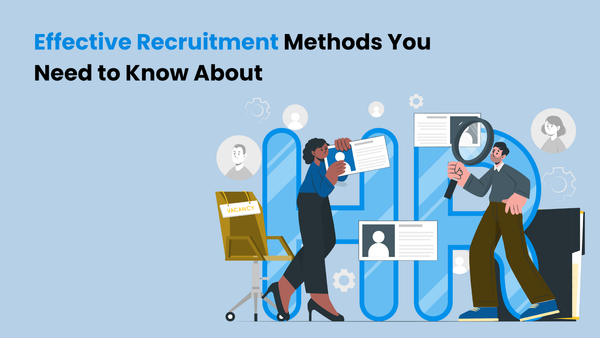Struggling with time-consuming recruitment processes and inconsistent hiring decisions? AI-powered talent assessment tools can help streamline your hiring, ensuring faster, more accurate candidate selection.
Hiring the right talent is crucial for any business, yet the process can often be time-consuming and full of uncertainty. With so many applications coming in and so many qualifications to evaluate, how can you ensure you're making the best decisions quickly and effectively?
AI talent assessment is revolutionizing how businesses evaluate candidates. Using AI-powered tools, companies can streamline the hiring process, reduce human error, and improve the quality of hires. AI tools analyze resumes, assess skills, and even simulate real-life scenarios to predict candidate success, making the process faster and more efficient.
In this blog, we will explore how AI-powered tools are changing the landscape of talent assessment, the key benefits they offer, and how businesses can utilize these tools to improve their hiring process.
Let’s start by understanding what AI talent assessment is and how it works to help businesses with hiring.
What is AI Talent Assessment?
AI talent assessment refers to the use of artificial intelligence tools and algorithms to evaluate candidates during the hiring process. These tools are designed to assess various aspects of a candidate's suitability, such as skills, experience, cognitive abilities, and personality traits, using advanced machine learning and data analysis techniques.
Unlike traditional methods that rely heavily on human judgment, AI talent assessment tools are designed to offer more objective insights, helping businesses make data-driven decisions. AI tools can analyze resumes, assess competencies through online tests, evaluate soft skills, and predict how a candidate might perform in specific roles based on historical data.
By automating many aspects of the recruitment process, AI tools allow recruiters and HR teams to focus on the most promising candidates, improving efficiency and overall hiring outcomes
Now that we know what AI talent assessment is, let’s look at why it’s so important for improving the hiring process.
Why AI Talent Assessment is Important
The benefits of AI talent assessment are vast, especially in today’s fast-paced, competitive job market. Here's why AI tools are becoming essential for modern hiring:
1. Speed and Efficiency
AI tools automate several aspects of the recruitment process, significantly reducing the time spent on tasks like resume screening, candidate matching, and initial assessments. This allows HR teams to focus on higher-value tasks like interviews and decision-making.
2. Objectivity and Consistency
Human bias can unintentionally impact hiring decisions. AI talent assessment tools reduce the likelihood of bias by analyzing candidates based on predefined, objective criteria. These tools ensure that all candidates are evaluated consistently, promoting a fairer hiring process.
3. Enhanced Candidate Matching
AI tools can match candidates to job descriptions with greater accuracy by analyzing past performance data and matching it to key job requirements. This ensures that candidates with the right skills and experience are prioritized.
4. Cost-Effective
By automating the screening and evaluation process, AI tools can reduce the costs associated with manual recruitment, such as spending too much time on unsuitable candidates. AI-powered assessments can also decrease turnover by helping to ensure that candidates are better matched to the role and company culture from the start.
5. Improved Candidate Experience
Candidates often appreciate faster, more transparent hiring processes. AI tools can provide quicker feedback and keep candidates engaged throughout the recruitment journey, offering a better overall experience and enhancing your company’s employer brand.
Now, let’s explore the key benefits that AI talent assessment tools offer to businesses.
Benefits of AI Talent Assessment for Employers
Here’s why businesses should integrate AI talent assessment tools into their recruitment process:
1. Better Hiring Decisions
AI tools help ensure that you make better, more informed decisions. With access to data-driven insights, employers can assess candidates more holistically and select individuals who are the best fit for the role and company.
2. Improved Diversity and Inclusion
AI-powered talent assessment tools can reduce bias in the hiring process, helping employers select candidates based on their qualifications and skills, rather than on subjective factors. This promotes diversity and inclusivity in your hiring process, ensuring that everyone has an equal chance to be considered.
3. Increased Productivity
Automating repetitive tasks like resume screening and initial candidate assessments saves time for HR teams. This allows them to focus on more strategic tasks, such as interviewing top candidates and making final hiring decisions.
4. Data-Driven Insights
AI talent assessment tools provide valuable insights about a candidate’s potential and performance. This data can be used to refine hiring strategies and improve the recruitment process over time, ensuring that you continue to hire the best talent.
Let’s take a look at the different types of AI tools available to help businesses assess candidates.
Types of AI Talent Assessment Tools
Several types of AI-powered tools are currently available to help businesses assess talent more effectively. Each type is designed to evaluate specific aspects of a candidate’s qualifications or performance.
1. AI-Powered Resume Screening Tools
These tools use natural language processing (NLP) and machine learning algorithms to analyze resumes and match candidates to job descriptions. They can quickly identify key skills, experiences, and qualifications, allowing recruiters to focus on the most relevant applications.
How It Works:
- AI-powered tools scan resumes and compare them against job requirements.
- They highlight candidates who meet specific criteria, saving recruiters time on manual resume reviews.
- These tools also rank candidates based on how well their resumes match the job description.
2. Skill Assessment Tools
Skill assessment platforms use AI to administer online tests that evaluate a candidate’s technical skills, cognitive abilities, or industry-specific knowledge. These tools often simulate real-world tasks, allowing candidates to demonstrate their abilities in a controlled environment.
How It Works:
- Candidates take tests that assess their knowledge in a particular area (e.g., programming languages, sales skills, analytical thinking).
- AI analyzes the candidate's performance and provides a report on their strengths and areas for improvement.
- This data helps recruiters assess whether the candidate has the necessary skills for the role.
3. Behavioral Assessment Tools
AI talent assessment tools that focus on behavioral traits use advanced analytics to evaluate a candidate’s personality, emotional intelligence, and communication skills. These tools often involve simulations or chat-based assessments that measure how a candidate reacts to different situations.
How It Works:
- Candidates are given hypothetical scenarios or interact with AI-powered chatbots that assess their responses to various situations.
- The AI analyzes their responses to gauge traits like empathy, decision-making, and stress management.
- This helps employers assess how well candidates might fit into the company culture or handle work-related challenges.
4. Video Interview Analysis Tools
AI-powered video interview platforms use machine learning to analyze a candidate's facial expressions, tone of voice, and body language during interviews. These tools can help recruiters assess soft skills and emotional intelligence, in addition to what is said during the interview.
How It Works:
- During a video interview, AI analyzes candidates' facial expressions, speech patterns, and posture.
- The system looks for signs of confidence, enthusiasm, or nervousness, providing insights into how candidates might perform under pressure or in team settings.
- Some tools also analyze the candidate’s language to assess their communication skills.
Now, let’s check out some of the most popular AI tools and their features that can improve your hiring decisions.
Popular AI Assessment Tools and Their Features
As companies increasingly rely on AI for talent assessment, various AI-powered tools have emerged to help streamline the hiring process. These tools evaluate candidates based on different aspects such as skills, behavioral traits, and job fit. Below are some of the most popular AI assessment tools and their key features:
1. Tidyhire
Tidyhire is an AI-powered recruitment platform designed to simplify the recruitment process by automating various stages, including resume screening, candidate matching, and talent assessment.
Key Features:
- Automated Candidate Matching: Tidyhire uses AI to analyze resumes and match candidates to job descriptions, significantly speeding up the hiring process.
- Skill Assessments: AI-powered skill assessments ensure that candidates possess the right technical and soft skills needed for the role.
- Behavioral Insights: Tidyhire's tools analyze candidates’ responses during interviews to gauge emotional intelligence, communication, and teamwork abilities.
- Personalized Candidate Experience: The platform uses AI to engage with candidates through personalized communication, improving candidate experience and satisfaction.
2. HireVue
HireVue is a popular video interviewing platform that incorporates AI to evaluate candidates' answers during video interviews. The AI analyzes verbal and non-verbal cues, such as tone of voice, facial expressions, and body language, to assess candidates' fit for the job.
Key Features:
- Video Interviews with AI Analysis: HireVue records video responses to interview questions and uses AI to evaluate both the content and delivery.
- Automated Scoring: AI automatically scores candidates based on their responses, ensuring a more objective and consistent evaluation.
- Bias Reduction: HireVue’s AI aims to reduce interviewer bias by focusing on objective data such as how candidates answer questions, rather than appearance or personal background.
- Integration with ATS: The tool integrates with Applicant Tracking Systems (ATS), allowing recruiters to manage all aspects of the hiring process in one platform.
3. Pymetrics
Pymetrics offers AI-driven games and behavioral assessments to evaluate candidates’ cognitive abilities and personality traits. By using neuroscience-based games, Pymetrics assesses traits like emotional intelligence, decision-making, and problem-solving.
Key Features:
- Neuroscience-Based Games: Pymetrics uses games designed to assess cognitive abilities and emotional traits rather than traditional assessments like psychometric tests.
- Predictive Analytics: The platform uses AI to analyze the candidate's game results and match them with the behavioral traits required for the role.
- Cultural Fit Assessment: Pymetrics evaluates whether a candidate’s personality aligns with your company’s culture.
- Diversity and Inclusion: The tool is designed to reduce bias, helping companies build more diverse teams by focusing on skills and potential rather than resumes.
4. Codility
Codility specializes in assessing technical skills, particularly for software development roles. Its AI-powered tools evaluate candidates’ coding abilities through real-life tasks and challenges, simulating tasks that candidates would face in the actual job.
Key Features:
- Real-Life Coding Challenges: Codility allows candidates to solve coding problems directly related to the job role, assessing their technical problem-solving skills.
- Automated Grading: AI automatically grades the submitted solutions based on factors like correctness, efficiency, and code quality.
- Customizable Tests: Employers can create coding challenges tailored to the specific needs of the role, whether it’s Java, Python, or another programming language.
- Collaboration with Teams: Codility offers a collaborative platform where hiring managers and team members can discuss and score candidates’ coding solutions.
5. Xobin
Xobin offers an AI-driven pre-employment skill assessment platform that helps recruiters evaluate candidates based on their technical and functional skills before moving to interviews.
Key Features:
- Customizable Assessments: Xobin allows businesses to design skill tests that align with the specific requirements of the job, whether it’s software development, data analytics, or marketing.
- AI-Powered Insights: The tool uses AI to analyze candidates' test results and provides insights into their strengths and weaknesses, helping recruiters make data-driven decisions.
- Candidate Ranking: Xobin ranks candidates based on their test performance, helping recruiters quickly identify the most qualified candidates.
- Real-Time Feedback: Candidates receive instant feedback on their performance, enhancing their experience and engagement.
When choosing the right AI tool for your hiring needs, it’s important to keep certain factors in mind. Let’s go over these key points.
Key Factors in Selecting AI Tools for Talent Assessment
When choosing the right AI tool for talent assessment, businesses need to consider several factors to ensure they are selecting the best option for their hiring needs. Below are key factors to keep in mind:
1. Relevance to Job Requirements
The most important factor is how well the AI tool assesses candidates based on the specific needs of the job. Not all AI tools are suitable for every role. For example, tools like Codility are designed for technical positions, while Pymetrics focuses more on personality and emotional intelligence.
Considerations:
- Does the tool evaluate the skills and competencies required for your job openings?
- Does it provide assessments that align with the tasks and responsibilities candidates will face in the role?
2. Customizability
Every business has unique hiring requirements. A good AI tool should allow you to customize assessments based on your specific needs. Whether it's designing coding challenges or setting up personality tests, the ability to tailor the tool to your job description is crucial.
Considerations:
- Can you create customized assessments or use pre-built ones?
- Does the tool support different types of assessments, such as technical tests, personality evaluations, and soft skill analysis?
3. Integration with Existing Systems
AI tools for talent assessment should seamlessly integrate with your existing recruitment systems, such as your Applicant Tracking System (ATS) or Human Resource Information System (HRIS). This allows for smooth data flow and helps streamline the hiring process.
Considerations:
- Does the AI tool integrate with your current ATS or HR system?
- Can the tool sync candidate data automatically, avoiding manual entry and ensuring consistency?
4. Candidate Experience
AI tools must provide a positive experience for candidates. Poorly designed or overly complex assessments can frustrate candidates and harm your employer brand. Ensuring the tool is user-friendly and offers clear instructions is essential for a smooth candidate experience.
Considerations:
- Is the tool easy for candidates to navigate?
- Does it provide helpful feedback to candidates, particularly for tests or assessments that may take a long time?
5. Bias Reduction and Fairness
AI tools should help reduce bias and ensure fair hiring practices. Make sure the tool has been designed to evaluate candidates based on their skills, experience, and potential rather than unconscious bias related to gender, ethnicity, or background.
Considerations:
- Does the AI tool have mechanisms in place to reduce bias in the screening process?
- Can the tool provide insights into candidates' potential rather than focusing on traditional qualifications like school names or previous companies?
6. Scalability
As your company grows, so does the volume of applications. It’s important to select an AI tool that can scale with your needs, handling large volumes of candidates while maintaining high-quality assessments.
Considerations:
- Can the tool handle an increasing number of assessments as your hiring needs grow?
- Does it provide insights and feedback on a large number of candidates without compromising on accuracy?
7. Reporting and Analytics
AI tools should offer detailed reporting and analytics, helping you make data-driven hiring decisions. Look for tools that provide insights into candidate performance, strengths, weaknesses, and overall suitability for the role.
Considerations:
- Does the tool provide detailed, actionable insights into each candidate’s strengths and areas for improvement?
- Are the analytics easy to interpret and use for decision-making?
Now, let’s see how Tidyhire uses AI to make talent assessment easier and faster.
How Tidyhire Helps with AI Talent Assessment
Tidyhire is an AI-powered recruitment platform that takes talent assessment to the next level. Here’s how Tidyhire enhances the talent evaluation process:
- Automated Resume Screening: Tidyhire uses AI to match resumes to job descriptions, allowing you to quickly identify top candidates.
- Skill and Personality Assessments: Tidyhire integrates skills-based testing and personality assessments to evaluate candidates’ fit for specific roles, ensuring you get a comprehensive view of each candidate.
- Behavioral Insights: Tidyhire provides data-driven insights into candidates' behavior and communication skills, which helps you assess their suitability for your company’s culture.
- Faster, Smarter Hiring: By automating the screening and assessment process, Tidyhire speeds up the hiring cycle, allowing you to move faster and hire smarter.
Tidyhire’s AI-powered tools help you assess talent efficiently, reduce bias, and make informed, data-driven hiring decisions.
Conclusion
AI talent assessment tools are revolutionizing the way businesses evaluate candidates. From automated resume screening to skill-based assessments and behavioral analysis, these tools streamline the recruitment process, save time, and improve the quality of hires.
AI in your hiring process, you can ensure that you are selecting the right candidates with the skills, qualifications, and personal traits needed to succeed in your organization.
Ready to enhance your talent assessment process with AI? Book a demo with Tidyhire today and see how our AI-driven platform can help you make smarter hiring decisions faster.






